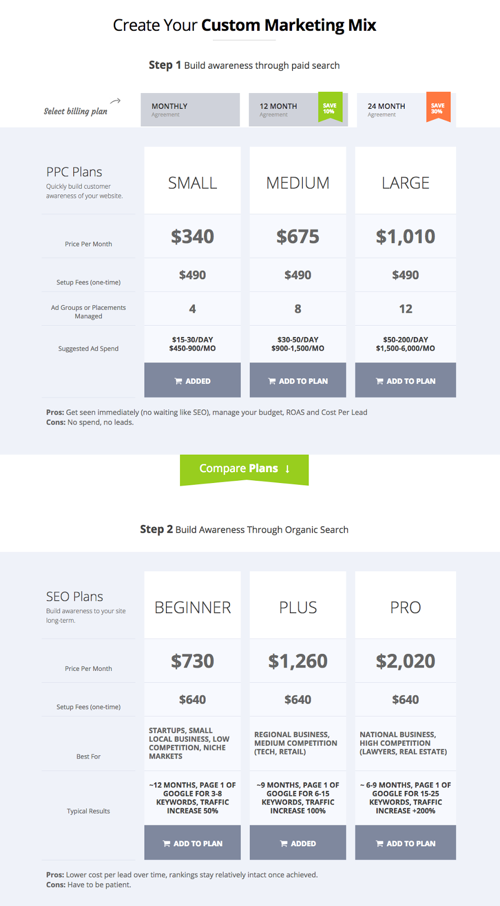by Kate Harvey
This blog post is part of our Customer Spotlight series. Throughout the series we highlight Chargify merchants and the lessons learned as they grow their subscription-based businesses.
Digital marketing agencies compete in a very crowded market. It is unique for any company to stand out in that market, but how does a company that started as a SaaS business pivot to become a successful agency providing services to companies like Vonage, Sears, and CareerBuilder?
Now a boutique digital marketing agency servicing companies around the world, Pear Analytics has been successful in an extremely competitive market by pivoting, creating a unique value proposition, and always staying focused on their True North.
The Beginning
When Pear Analytics began, the company’s offerings were SEO automation tools and software.
In 2008, Pear Analytics CEO and founder Ryan Kelly had built up a solid business providing SEO consultant services to clients. With each client, Kelly found himself going through the same initial steps to gather data about their website. His engineering background kicked in and he worked on a way to automate the initial data gathering process.
Kelly created an algorithm which would scan a website, “and by gathering and analyzing a vast amount of data that would normally take a human days to collect, within minutes pop out a score, from 1 to 100 that indicated how optimal the website was. It would also provide an analytic breakdown of the website in many different SEO related categories: keywords, website structure, tagline, etc.”
Once the algorithm was complete, he hired a developer to create the product. The result was SiteJuice, highlighted on Pear Analytics’ 2009 website:

Despite winning the highly competitive InnoTech Beta Summit in March 2009 and receiving coverage on media giants USA Today, BBC, PCWorld, CNN.com, and more, ultimately there wasn’t a large enough customer base to sustain the product or company.
Pivot Or Die
Pivoting from SEO software to services was both a natural progression and a necessity. Pear Analytics’ software users would often ask if the company could help them fix the SEO issues their products were discovering. Initially, the company’s focus remained exclusively on software, but by 2011 Kelly determined a pivot was necessary.
We pivoted into services because we were either going to pivot or die.
Ryan Kelly, Founder & CEO of Pear Analytics
Inspired by the Silicon Valley startup success legends, Kelly admits he wanted Pear Analytics to perform just like those startups. He worked hard to build a scalable, repeatable business, but found it more difficult to accomplish when offering services rather than software.
For the company to thrive they would need a team, processes, and support system. The team discovered those things required more capital, resulted in more overhead, and delayed the ability to hit scale for a few years.
Again, Kelly pivoted. In 2012 Pear Analytics spent a substantial amount of time and money to “automate the process of getting a new customer, allowing the customer to pick a plan, signup, and move forward.” The company did significant development to calculate one-time fees, setup fees, recurring fees, etc.

With the help of tools like Chargify, Pear Analytics soon made it possible for new customers to add desired services directly to a shopping cart, and the payment processing was quick and seamless. “It helped us streamline what we were doing in the service business even though we really started in the SaaS business,” explains Kelly.
While the ability to select and pay for marketing services online isn’t unusual today, those capabilities were beyond what other boutique digital agencies offered customers at that time.
Scaling & Lessons Learned
We’ve already gone over one of the most important lessons Pear Analytics learned: figuring out their business model. Even their subscription model was innovative. While there has been a large influx of digital marketing agencies transitioning to subscription billing recently, Pear Analytics was an early adapter of the recurring revenue business model in their industry. This allowed the company to reap the rewards of a subscription business while other competitors in the market remained focused on the unpredictable income of hourly or project-based billing.
Some of the other lessons Pear Analytics learned as the company grew:
True North & a unique value proposition
How does always staying focused on their True North correlate to their unique value proposition?
Pear Analytics has always been uber-focused on results. It’s the True North that guides their company purpose and roadmap. To that end, they don’t start working on anything else for a client before they determine if the client’s analytics are setup and tracking correctly.
In order to to be really focused on results you need to make sure accurate measurement tracking is in place.
Ryan Kelly, Founder & CEO of Pear Analytics
He explains that while it is surprising “that you have companies spending money on marketing and they’re not measuring it properly,” it is a very common issue. Either the analytics aren’t set up properly or the client isn’t tracking anything at all (yes, really), explains Kelly.
In a sea of competitors, Pear Analytics divides and conquers with their unique value proposition: ensuring a foundation of accurate analytics and measurements. The foundation makes Pear Analytics more equipped to successfully analyze, create, monitor, and optimize digital marketing campaigns for clients moving forward.
Eliminating the need for an accounting department
This was actually a lesson Kelly says he started learning when working in previous marketing agencies. Traditionally, marketing agencies bill by the hour or project. Which means there also needs to be an accounting department devoted to following up with clients to ensure the agency is paid in-full.
I told myself years ago ‘I never want to deal with chasing customers for payments.’ So, the easiest way to get out of that is to set customers up on a subscription billing system and not have to worry about it. The smartest thing we did was to eliminate the need for an accounting department. Chargify handles all the complexities of subscription billing for us. We don’t have to worry about any of that.
Ryan Kelly, Founder & CEO of Pear Analytics
“Recurring billing helped us be more efficient from Day 1,” he explains.
Using Chargify to manage all their subscriptions and recurring billing not only eliminated the need for an accounting department, but also allowed for a better customer experience for Pear Analytics’ subscribers. Payments are processed seamlessly, automated emails communicate if there is a need to update their credit card on file, and their customers have their own secure billing portal where they can update their own billing information.
Being able to rely on a best-in-class recurring billing platform and utilizing employee resources saved by not having an accounting department have been key in helping the company scale.
Remaining Competitive
Going remote to attract the best talent
Part of being able to continue to grow and succeed as a company is being able to attract and maintain the necessary talent to run a first class digital marketing agency.
Initially, we were heavily focused on attracting local talent in San Antonio, where ‘in-office collaboration’ was a big deal. Now, we’re more open to growing with a distributed team, and we have found ways to make it work.
Ryan Kelly, Founder & CEO of Pear Analytics
He explains the company has seen a need for more senior-level talent as they’ve scaled. Being able to extend the job search to the entire United States has allowed for a larger hiring pool.

Currently, they have distributed team members in New York, Houston, and Dallas. Approximately 60% of the team is in the San Antonio office. Pear Analytics uses a number of tools, including Slack, to make sure the distributed employees feel part of the company.
Always evolving
The digital marketing space changes and evolves quickly. Pear Analytics has remained competitive by doing the same.
“We have to always be changing in order to become increasingly more relevant,” says Kelly.
The company adapts the services they offer to the changing industry to ensure both Pear Analytics and their customers remain industry leaders.
For instance, a few years ago the company didn’t offer website design services. Now they do. A couple years ago they didn’t create and manage clients’ Facebook and LinkedIn ads. Now they do.
Early clients utilizing Pear Analytics’ SEO services frequently requested the company also offer paid advertising, or Pay-Per-Click (PPC), services. Having the same company handle a clients’ SEO and PPC made a lot of sense for both clients and Pear Analytics.
Kelly also created a free tool, PPC Budget Calculator, to help answer one of the most common questions they get: “How much should I spend on paid ads?”
The PPC Budget Calculator quickly shows businesses how much they should budget for their PPC campaign based on their industry and keywords. Users simply have to type in a few keywords relevant to their business and the tool does the rest.
With all the their success and growth, we were curious to learn where Pear Analytics is headed next…
Future Growth
According to Kelly, the company is focused on growing their paid search division.
More and more businesses are realizing the same. Paid search is complex and there is money being lost if they don’t have the expertise to fully optimize paid ads.
To that end, in the future Kelly would like to create a tool which shows a business owner how much of their current AdWords budget is being wasted. Utilizing data from the actual AdWords account, the tool would create a report card which outlines what money could be better utilized for more conversions.
To learn more about how Pear Analytics can help your business engage your website visitors and nurture them into qualified leads and conversions, visit https://pearanalytics.com/.




